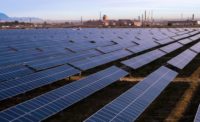The Solar Thermal Alliance of Colorado (STAC) released its “road map” report in late January after nearly a year of working with stakeholders throughout the state to spur investment and local economic growth. The report provides Colorado with a detailed guide for making the state a global leader in solar thermal research, development, manufacturing and deployment.

The “Colorado Solar Thermal Roadmap” was presented to a group of elected officials, researchers, industry executives, environmental leaders, academics and residents at the Denver Housing Authority’s Mulroy Opportunity Center, located in west Denver. Mulroy is a solar-powered installation and an example of the savings derived from solar thermal heating and as the launch site of the STAC’s statewide initiative.
According to the National Renewable Energy Laboratory and the Florida Solar Energy Center, Colorado has a natural advantage in the solar industry over other states because of its dramatic daily temperature swings, abundant sunshine, cold ground water and annual heating loads.
The Roadmap’s recommendations will facilitate progress toward goals that state leaders have articulated for years: economic growth, energy independence, reduction in CO2 and other emissions, reduced total life-cycle costs of fossil fuels and improved state import-export balance, to name just a few.
“Solar thermal technologies offer impressive economic benefits for Coloradans,” notes Neal Lurie, executive director, Colorado Solar Energy Industries Association. “Not only do they help consumers reduce their monthly utility bills, but solar thermal is a labor-intensive business that provides significant job creation benefits, creating tremendous opportunities for qualified local design, manufacturing, sales, distribution, and installation professionals.”
The Roadmap’s goals include adding more than 24,000 new jobs in Colorado by 2050, including positions in sales, distribution, manufacturing, and over 10,000 jobs in solar thermal installation.
Path to Growth
The Roadmap also identifies a clear strategy for how Colorado can effectively reach these goals, detailing key areas:
• Increasing consumer awareness by developing consumer relationships, improving communication, and ensuring the quality delivered by the state’s solar thermal industry.
• Developing financial mechanisms through collaboration with financial institutions and the deployment of pilot financing programs.


